Settling the New World: Colonial History Unit Study
During the elementary and middle school years, our history studies – for the most part – take place as unit studies. In a relatively short amount of time, we can cover SO much material in fun and interesting lessons. And this unit was no exception!

Colonial History Unit Study
Over the course of about six weeks, our Colonial History unit study covered everything from the first colonies of Roanoke, Jamestown, and Plymouth to the settlement of the 13 original colonies and life in colonial times.
This post contains affiliate links.
Colonial History Notebooking
We used two central “spine” books during this unit. Hands-On History: Colonial America provided us with fantastic notebooking activities! The reproducible notebooking pages and mini-books helped my children document the period thoroughly and beautifully.
Take a look at some of their pages! (I used colorful cardstock to make the pages exciting. The colors made the final journals look great, too!)
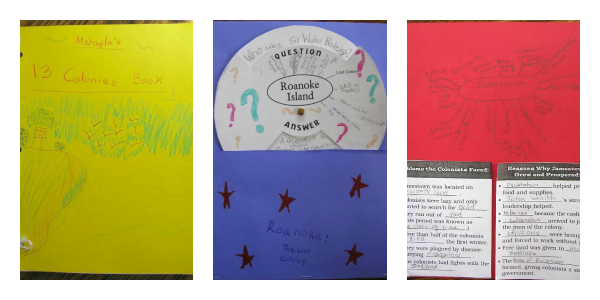
{Cover page | Roanoke question wheel | Jamestown fact web}
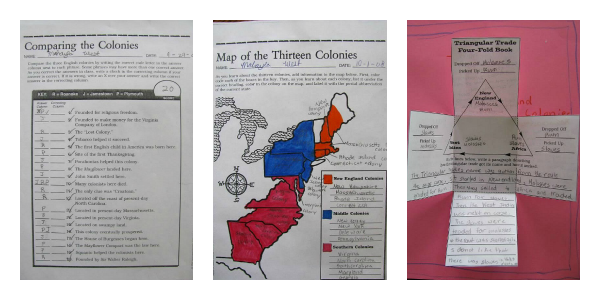
{Colony comparison chart | 13 Colony mapping | Mini-book of Colonial trading}
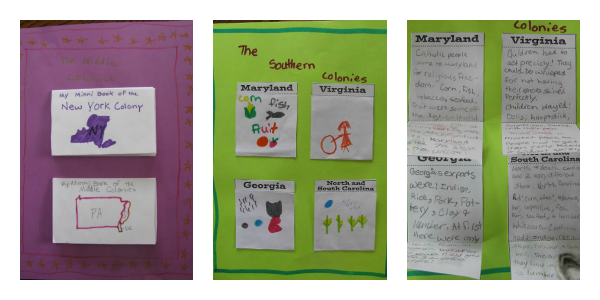
{History of the 13 Colonies mini-books}
Hands-On Learning for Colonial History
Not all our units are as jam-packed with hands-on activities as this one. Too many hands-on activities can sometimes become overkill, but we never tired of trying new things during this unit! Thus, there is a heavy load of hands-on projects. Most of the ideas came courtesy of Colonial Kids.
Believe it or not, the pictures below don’t show all the hands-on activities! Some additional activities included making hasty pudding, playing leapfrog, bb gun target practice, sewing, knot tying, candle making, knitting, and decoupage.
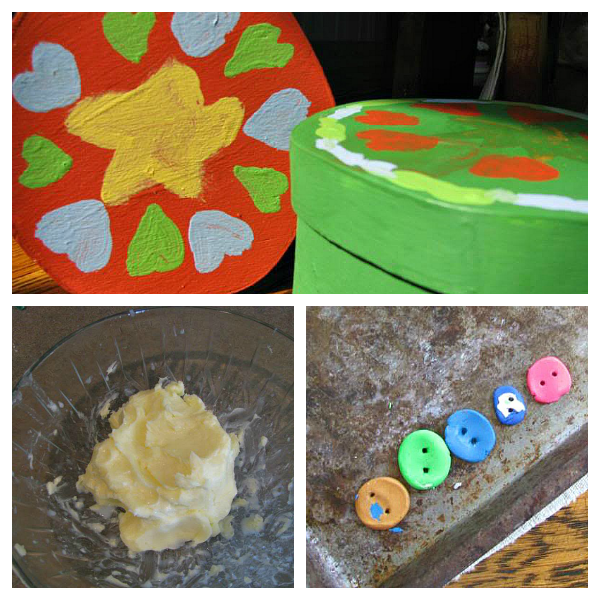
{Colonial style boxes painted with typical Colonial designs | Homemade butter | Clay buttons}
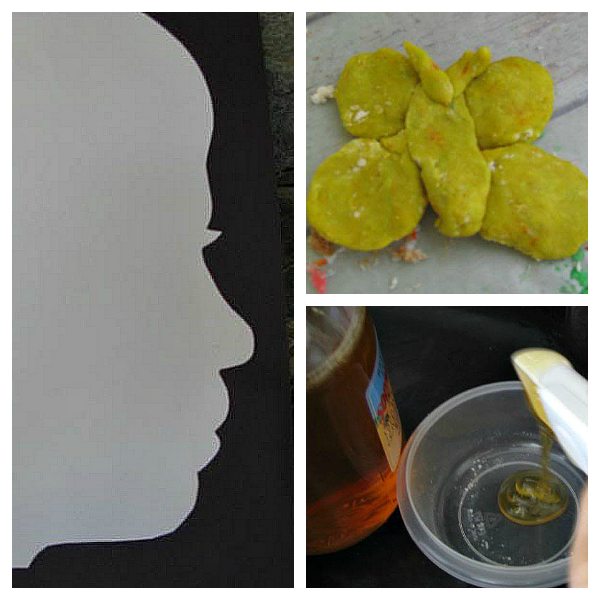
{Silhouettes | Bread dough figures | Homemade honey cough syrup}
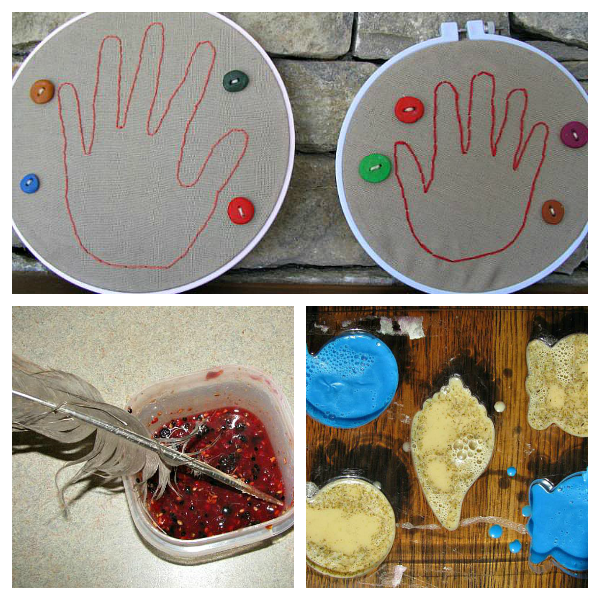
{Embroidery hand-prints using the clay buttons | Writing with feather pen and berry ink | Homemade soap}
Colonial History Living Literature
As a family, we enjoyed two excellent historical fiction books. I read Night Journeys by Avi aloud, and we listened to The Witch of Blackbird Pond by Elizabeth George Spear as an audiobook in the car.
During the unit, my oldest (12) was assigned two books: Calico Bush by Rachel Field and Indian Captive by Lois Lenski. I asked her to complete a “book report” on one of the books using a resource called Better Than Book Reports: More Than 40 Creative Responses to Literature. While the book report guide has many project-based ideas – mobiles, dioramas, timelines, etc. – she chose to write a traditional book report with an oral presentation.
Because he was in the middle of reading other books for other subjects, my son (9) only had to read one straightforward book as part of the unit. Witch Hunt: It Happened in Salem Village by Stephen Krinsky is a step 4 reader with plenty of information about the Salem Witch Trials for a young student.
Colonial History Online Resources for Kids
Jamestown Online is a fun game that allows you to make decisions like the original settlers would’ve had to make. In the end (it only takes a few minutes), you see how well your colony survived based on your choices. My kids loved it!
Colonial Williamsburg Kids Zone has many historical online games that reinforce academic skills. They are short, sweet, and fun!
PBS’s Colonial House site has several interactive games and quizzes. Would you have survived the colony?
Quia has a fun colonial quiz.
End-of-Unit Project-Based Learning for Colonial History
I typically end our unit studies with one or more open-ended projects that my children complete independently. The projects assess what was learned during the unit and always require some level of research.
For example, my son completed a fantastic research-based brochure of the 13 Colonies!
This unit study is one of my all-time favorites, and my children agree. We enjoyed incredible living books, fun and meaningful hands-on projects, and even some field trips. I highly encourage you to spend several weeks studying this amazing era of American history in your homeschool!
Learn how to plan unit studies like a pro!
Planning unit studies and project-based learning isn’t as complicated as you might think! These video classes for parents can help you easily implement both into your homeschool.




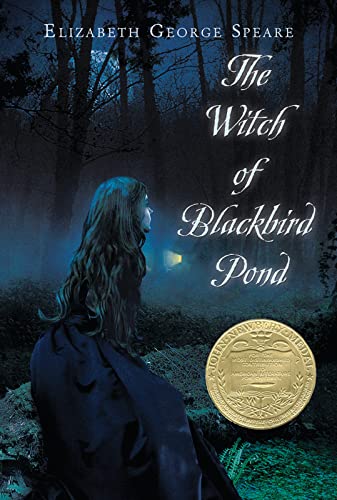



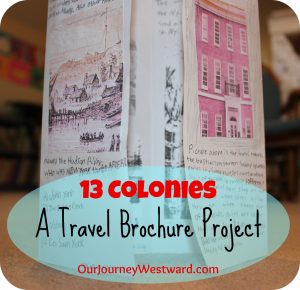


love love love the handprint embroidery!
Looks like you had some interesting studies going on. I really love to add in as many hands on activities as I can. I think it gives the kids a better visual. I will have to check out some of the links you shared and book mark them for when we get to the subject.
Hey there! This could be already listed and I’m missing it, but other than read alouds, what was the spine for your information? Did you use any specific text aside from the Living Books they read?
Hi, Jennifer. Good question. The two activity books actually have quite a bit of information in them, but we supplemented with informational books from the library for sure. Unfortunately, I didn’t keep a running list of those books during this unit. Anything on colonial history or colonial life would be good.
Thanks for sharing! We’re partway into a long study of the colonial period too and it’s great to see some different ideas. Looks like your family had a lot of fun!
We really did have so much fun! Enjoy your study!!
I have finally figured out that my daughter (10) learns much better and has way more fun when we do unit studies…so this year, I was thinking we will cover Colonial period, Revolutionary period, Wild west…ect…I love all the ideas that you have on your blog…I use it a ton in my planning!! But, I did have a question…do you do your unit studies like 3 days a week and then do a different science study a couple days a week? I wasn’t sure if you incorporated science with your history study or did it on a separate day.
Hi Jeni! It depends. Sometimes we’ll do history 3x/wk and science 2x/wk. Sometimes a history or science study “takes over” and we only do one until it’s finished. My children definitely prefer to dive into one or the other rather than split up our week between the two. Have fun with your American studies this coming year!